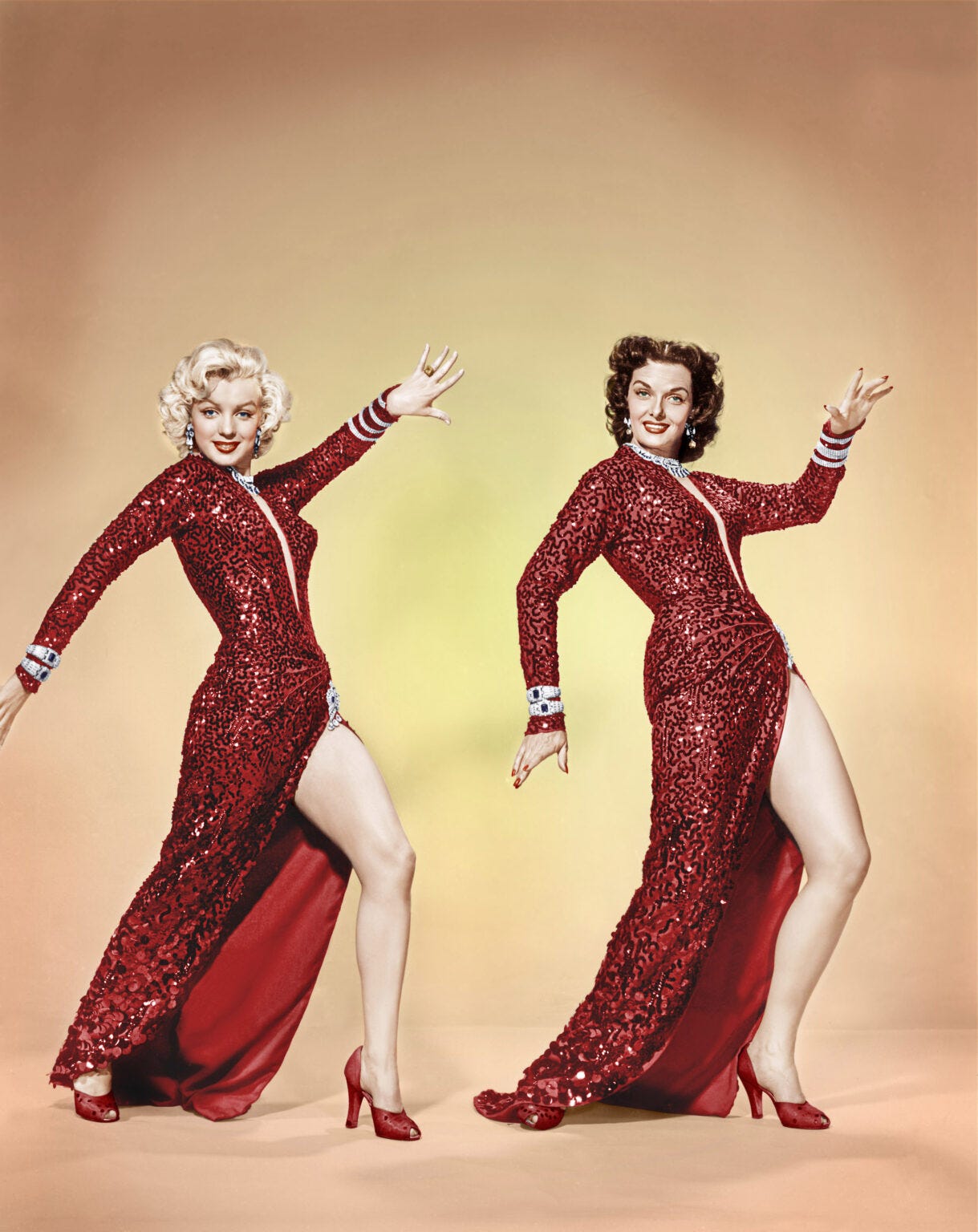Gentlemen Prefer Spreaders
The Delilah and Dr. Laura of newsletters is FAFO-parenting, faking our zillions, and quiet quitting our mankeeping gigs
Welcome to Spreadlandia, where two veteran editors read it ALL to winnow out only the best: juicy yarns, big ideas, deeply personal essays, and hot goss—aka, the full Spread. Plus: original interviews, podcasts, and more. Come hungry!
Spread Herd:
The race for this week’s Readers Choice Award was no contest at all, with legions of you shooting us the same New York Times link, “Why Women Are Weary of the Emotional Labor of ‘Mankeeping.’” The concept—not to be confused with manscaping, manspreading, or mansplaining—is that while we brilliant, empathetic, multitalented, socially astute women (pats self on back) relish in connecting with one another early and often, our male partners often do not, making us the only people in their lives that they can really talk to. According to a Brooklyn therapist, “partners have become their unofficial therapists…‘doing all the emotional labor,’” a big favor that a postdoc fellow at Stanford has dubbed “mankeeping,” and that any woman who has ever experienced it would call “a LOT.” Times reporter Catherine Pearson who—quick bio check, yep— “live[s] in Brooklyn with my husband and our two sons” evidently had to strain not at all to find women and experts to speak with for the story, but in keeping with the article’s thesis, male partners were harder to come by due to their inability to open up to anyone who’s not their girlfriend or wife. That is, except for Glenn, 37, who boldly opened his mouth, about feelings, to a third party: “His gut reaction when his girlfriend first described mankeeping to him was that it seemed consistent with what he’d seen play out in many heterosexual relationships. He wondered, ‘OK, but is that bad?’” Is mankeeping just a stepping stone of progress: Men are finally able to open up about their feelings—yay, vulnerability and openness! But they can only do it with their chosen person/dumping ground… who must take this burden where, exactly? To her own therapist? Or to the group chat?
Confidentially,
Rachel & Maggie
P.S. Feel free to slowly savor these reads as we will be OOO next week enjoying the last gasp of our summer vacations. See you back here—same time, same place—the week of August 11.
P.P.S. Men’s haute fashion has taken a sudden turn toward the 2012-era J.Crew aesthetic, go figure, and Maggie spoke with fashion writer supreme Max Berlinger about it in his Substack, Add 2 Cart here. Merci, Max!

“EVERYTHING is about wombs.” New Yorker contributing writer Anna Russell is extremely competent. Her cervix? Not so much. When she’s put on bedrest mid-pregnancy, she has plenty of time—too much, really—to consider all the bed-resting literary figures before her and the sense of dislocation that comes with 20 sedentary weeks. “Like Alice in Wonderland, I found that everything was suddenly too small or too large for my body. I had entered a temporary space, one in which I struggled to operate with the ease and efficiency to which I had grown accustomed.” Read “Notes on Bed Rest.” here.
Soft Power: The second-most reader-recommended story this week was WSJ’s “Goodbye Gentle Parenting, Hello ‘F–Around and Find Out.’” (Though we did have to reread the headline a couple of times because—note to the Dow Jones copy desk—replacing a “uck” with an em dash is just not intuitive! Please use “F***” next time like a normal person!) Anyway, FAFO is “a child-rearing style that elevates consequences over the ‘gentle parenting’ methods that have helped shape Gen Z,” and the examples that Ellen Gamerman cites in the story are primo: One mom throws her fully clothed kid into the pond after he sprays her with a water gun again; another mom pats herself on the back with the perhaps back-in-vogue phrase “my kid is tougher than your kid.” The hard-liners almost had us, until the article likens the parenting style to the way Trump governs, which…can’t be good! Guess we’ll keep tearing our hair out while our children flat-out ignore our tender, loving guidance? Read it here.
The Kids Are… All Right? In the Cut, Monica Corcoran Harel writes that her 14-year-old is unbothered about achieving popularity in a way that throws Harel for a loop. Why? Harel now knows, after a recent diagnosis, that her daughter has high-functioning autism. This could have been devastating except… it wasn’t. The remarkably sensible Tess seems unbothered by the diagnosis; Harel even argues (in a non-Pollyanna way) that not being neurotypical seems to make her somewhat immune to the herd-mentality compulsion to fit in and be popular that besets most kids her age. Tess doesn’t need to be like everybody else—and, wonder of wonders, Tess herself knows it. Read it here.
Curtain Call: In the stage version of the Spread, Anna Deavere Smith directs, writes, and plays all of us: Rachel, Maggie, intern Miranda, and all of you, dear readers. (We’re working out the details with her agent but The Lady is interested y’all.) The Atlantic has published an adaptation of the work she performed as part of the 2024 Mellon Lectures at the National Gallery, an excavation of her own family history (especially interesting when read in quick succession with the FAFO-parenting piece!) as well as other formative experiences she had between 1950 and now, including an interaction with a handsome bull rider she met in Shoshone, Idaho, an interview with Bryan Stevenson, and a conversation with John Lewis. The sweeping essay is nonlinear and takes some focus, but it’s worth having another cup of coffee and dialing in. Read “When You Don’t Look Like Anything” here.

Seem Rich or Die Trying: We all wish we could go to shmancy galas and hang out with glamorous elderly women looking to offload their jewels. But how? This week, New York’s James D. Walsh reveals that all we have to do to live the high life is pretend to be a trust funder, launder $10 million from our bajillionaire employer, and illegally donate it to foundations for the arts. Very Talented Mr. Ripley. Very philanthropic Bling Ring. Very chic. (N.B.: Risks include your ex calling you “weird” and a liar in the feature article about your mysterious and untimely death.) Read “The Most Generous Man in New York” here.
Death Becomes You: How often do you read a story about dead bodies and think, What a fun palate cleanser! That’s Dazed’s jam, we suppose. In “Dead gorgeous: How cadavers are fuelling the beauty revolution,” we’re treated to a look at how the beauty industry relies on dead bodies both for plastic surgery practice and to mine for ingredients! Read it here if you dare.
From Borat to…Blech: Did a man ever really get ripped for a woman’s sake? The Telegraph argues that Sacha Baron Cohen’s disturbingly manospheric divorce bod certainly wasn’t carved to please womankind. He owes those bulging pecs to a private chef, Ozempic, and some dude whose Insta handle is @theangrytrainer. #TeamIslaForever! Meanwhile, over at the Baffler, in a story called “Humping Iron” (good one), Petra Browne lays out the horny, porny underpinnings of the female bodybuilding industry, arguing that female bodybuilders only exist as “a defense…against ‘the public’s lingering suspicion that bodybuilders were gay.’” Turns out the professional female bodybuilder’s lot in life is worse than we could have imagined: some get paid to wrestle clients, then deliver a happy ending massage. Read it here.
Fuchsia marabou feathers, no less: Praise be to Women’s Health for delivering a lengthy profile of a woman in… women’s health! Just like the olden days. The only problem we found with this story about Cindy Eckert, the drug company founder who dresses like a character from Legally Blonde and fought for and got flibanserin (aka Addyi, aka “the female Viagra,” but also really not that) FDA approved, is that the story neatly sidesteps the drug’s effects, or lack thereof. It’s great that she pushed to find a treatment for hypoactive sexual desire disorder, or stalled out libido—which effects nearly 10 percent of women, mostly 45 and over—but please, WH, let’s talk straight: This little pink pill may be a step in the right direction but it has not solved this problem. Back to the lab, folks! Read “She Wears Bright Pink And Fights For Women’s Pleasure” here.
The sign on our parking spot reads Spread ’Em: Are your Spreaditors a little jelly that Amy Odell has made a cottage industry out of zeroing in on the most obvious and arguably overexposed women on the cultural map—no needles in the haystack here!—and writing (good!) books about them that become (big!) bestsellers? What, uuuuus, envious? Never! Now Odell, the author of Anna, is giving us Gwyneth,1 and yes, goddammit, it turns out there is more we want to know about the blondest of them all. Read friend-of-Spread Keziah Weir’s interview with Odell, “Reserved for G-Spot” (named for GP’s parking spot sign of course) in Vanity Fair here.
Party Girl: Is it possible that Sascha Seinfeld gazed across the digital landscape at Cazzie David and thought, I’ll have what she’s having? Jerry and Jessica’s daughter has emerged from relative nep-onymity to pen an opinion piece for the Free Press about Partiful, the party-planning app of choice among Gen Z, which she argues has added—with its head-count monitoring and constant reminder emails—a “plasticky, sterilized layer” to nightlife for the young ones. And to think we still get a little dopamine boost when a Paperless Post pops up in the ole gmail. Read “Why My Generation Is Bad at Partying” here.
All the Pretty Horses: Speaking of nepos, the Spread’s not-so-secret favorite is Steve-minus-the-St Jobs (aka the lovely Eve) whose father once predicted she would one day either run Apple or become President of the United States but who for now is a model and equestrian (naturally) who just got hitched to another equestrian. Her mom’s bestie Kamala Harris—remember that campaign moment?—was on site. Vanity Fair has the goods here.
Nope. “Kelli Maple tenderly sets her bundle of joy, Naomi, into a Nuna car seat and drives her to the mall. When they arrive, Maple, 23, places little Naomi, dressed in a onesie and hair bow, into a high-end stroller (complete with a portable sound machine, stuffed animal and a pacifier). Giggling, Maple and Naomi shop for tiny clothes. Most passersby would mistake them for a typical mother and daughter.” Except they’re not because Naomi is a DOLL, people, the hyperrealistic “reborn” kind that costs $8,000. A few months back we pointed you to a story about grown women who can’t part with their stuffies. Now WSJ’s Rory Satran gives us grown women tenderly mothering babydolls. Some are doll collectors but others get into it after a miscarriage, or to ease PTSD, so we did try to be nice about it but… it’s gonna be a hard no for us. Maybe you’re not as hard-hearted as us, so fine, here.
Did someone forward you this email? To get the full Spread with all the fixins every week, become a paid subscriber here.
What’s next in this stable of one-name-only lady bios? Oprah? Meghan? Michelle? Kate? Oh wait, we know: Maggie, and then Rachel, not necessarily in that order.

So glad to have a name for this, Mankeeping.